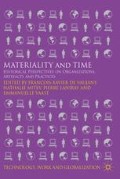Abstract
The conditions for the practice of the historian’s craft have changed over the last 30 years or so, and they continue to change in front of our eyes. The convenient formula of crisis has often recurred: one has spoken of the “crisis” of history, of history “disoriented” while our relationship to time has been day after day transformed. The future closed in on itself, the past was obscured, and the present was becoming our unique horizon (Hartog, 2012). What then becomes of the place and function of he who defined himself in the 19th century — when history was eager to be counted as a science and organized as a discipline — as the scholarly mediator between past and present about the most important, if not unique, object, the Nation or State, in a world that henceforth privileged the current period, often only the present, which declared itself globalized and which has, in some cases, presented itself (e.g., in Germany for a while) as post-national?
Access this chapter
Tax calculation will be finalised at checkout
Purchases are for personal use only
Preview
Unable to display preview. Download preview PDF.
References
Bloch, M. (1997). Apologie pour l’histoire ou métier d’historien. Paris: Armand Colin.
Dumoulin, O. (2003). Le rôle social de l’historien, De la chaire au prétoire. Paris: Albin Michel.
Dupuy, J-P. (2004). Pour un catastrophisme éclairé, Quand l’impossible est certain. Paris: Seuil.
Fabian, J. (1983). Time and the Other: How Anthropology Makes Its Object. New York: Columbia University Press.
Fassin, D., & Rechtman, R. (2007). L’empire du traumatisme, Enquête sur la condition de victime. Paris: Flammarion, p. 16.
Hartog, F., & Revel, J. (eds) (2001). Les usages politiques du passé. Paris: Editions de l’Ecole des Hautes Etudes en Sciences sociales, Enquête, 1.
Hartog, F. (2012). Régimes d’historicité, Présentisme et expériences du temps. Paris: Points-Seuil.
Hartog, E. (2013). Croire en l’histoire. Paris: Flammarion.
Koselleck, R. (1985). Futures Past: On the Semantics of Historical Time. Cambridge: MIT Press.
Ricoeur, P. (2000). La mémoire, l’histoire, l’oubli. Paris: Seuil.
Roginski, A. (2009). Memoire du stalinisme. Le Débat, 155(3), 119–130.
Wieviorka, A. (1998). L’ère du témoin. Paris: Plon.
Editor information
Editors and Affiliations
Copyright information
© 2014 FranÇois Hartog
About this chapter
Cite this chapter
Hartog, F. (2014). The Historian’s Present. In: de Vaujany, FX., Mitev, N., Laniray, P., Vaast, E. (eds) Materiality and Time. Technology, Work and Globalization. Palgrave Macmillan, London. https://doi.org/10.1057/9781137432124_9
Download citation
DOI: https://doi.org/10.1057/9781137432124_9
Publisher Name: Palgrave Macmillan, London
Print ISBN: 978-1-349-49239-8
Online ISBN: 978-1-137-43212-4
eBook Packages: Palgrave Business & Management CollectionBusiness and Management (R0)

